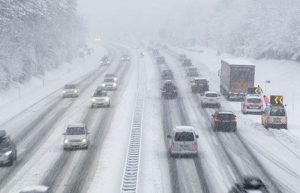Keep these things in mind before traveling over the holidays
December 20, 2021
Airlines are expecting a 184 percent increase over last year in passengers flying over the Christmas and New Year’s holiday weeks. (Photo courtesy of Chicago O’Hare International Airport)
Despite COVID-19 cases going up nationally, AAA reports more than 109 million people will be traveling at least 50 miles or more from home in cars, planes or trains over the Christmas holiday, between Dec. 23 and Jan. 2. That represents a 34 percent increase from 2020, when the country was in the deep throes of the pandemic.
Gas prices slowly dropping down over the past few weeks is an encouraging sign for road travel and airlines are projecting a 184 percent increase in passengers from last year.
“Americans who canceled their vacations in 2020 want to gather with family and friends for the holidays this year, although they will still be mindful of the pandemic and the new omicron variant,” said Paula Twidale, senior vice president of AAA Travel. “With vaccines widely available, conditions are much different and many people feel a greater level of comfort with travel.”
Anyone traveling, especially those boarding planes and trains, for the holidays need to consult the Centers for Disease Control and Prevention guidance for requirements for vaccinations and mask wearing.
Masks are required for everyone on planes, buses, trains, and other forms of U.S. public transportation and within transportation hubs such as airports and stations.
You should also check on local COVID-19 guidelines in place at your destination.
AAA offers a COVID-19 Travel Restrictions Map that helps travelers understand closures, recommendations and requirements when traveling in the U.S.
Being safe on the roadways
While many nostalgically wish for a white Christmas, the chances of snow on the holiday historically are less than 50 percent for Illinois.
A White Christmas is defined as having at least 1 inch of snow on the ground Christmas morning, according to the National Weather Service. Across the northern third of the state, chances of that snow occurring are generally in the 40-60 percent range, with 20-40 percent in central Illinois, and 25 percent or less in the southern parts of the state, according to the NWS.
Still, drivers need to be prepared for all kinds of winter conditions whether staying in Illinois or heading across country.
It is advised to get an inspection to check key components like the battery, fuel system, tires, brakes and fluid levels to avoid an unnecessary breakdown. It’s important to do this as early as possible in case there is an issue that needs to be fixed.

If traveling by car over the holidays, AAA advises to be aware of busy drive times and winter weather to avoid getting caught in congested roadways. (Photo courtesy of AAA)
Drivers should have an Emergency Road Kit equipped for winter weather in the trunks for their vehicles before leaving home. (For a list on what should be in that, see (http://exchange.aaa.com/wp-content/uploads/2013/10/Winter-Car-Care-Checklist1.pdf)
Your home while you’re away
If you plan to travel for a week or more over the holidays, consumer economics educators with the University of Illinois Extension Services recommend unplugging certain appliances to reduce your utility bill. Small appliances that you normally use daily, such as the coffee pot, toaster, and TV, don’t need to stay plugged in when no one is at home for several days. Also, make sure you unplugged any space heaters you may routinely use. Untended space heaters are a common cause of residential fires during winter months.
“Another option is to purchase a SMART power strip. That way you can keep on the things you want, but turn the rest of the electronics off just with the flick of a switch,” Kathy Sweedler and Camaya Wallace Bechard stated in the article “Winter Checklist: Tips for a Warm, Safe Home.”
Just as you need to prepare for winter storms and snow while on the road, it is a good idea to have a plan for your house to be protected while you are away. Make arrangements with a relative or neighbor or snow removal service in case of a snowstorm hits while you are out of town. If you have a family member or local kid tabbed for the job, make sure you leave easy access at your home to shovels and or snow blowers and rock salt.
In terms of home security, have a timer set for indoor or outdoor lights to go on and off daily and make sure someone picks up packages or mail that may get delivered in your absence.



